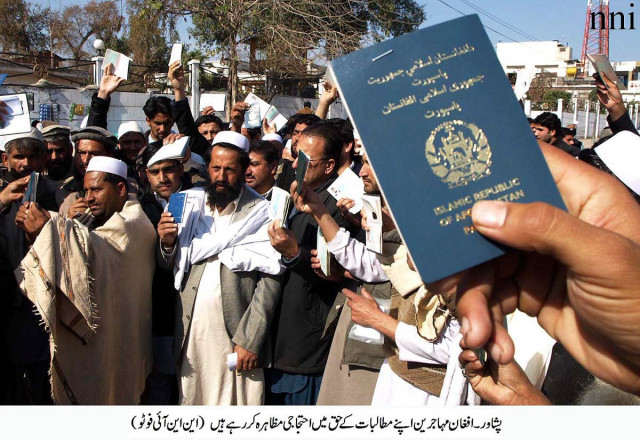The question of Afghan refugees
While implementing repatriation policy, the emphasis must always be on voluntary, gradual and a dignified return home

Pakistan hosts almost 1.6 million registered and another million unregistered Afghan refugees — the largest protracted refugee population globally. PHOTO: NNI
There is, therefore, an urgent need to devise a mechanism that would cater to the welfare of Afghan refugees, especially those who are seeking medical attention in the absence of any monetary help from international institutions responsible for looking after refugee populations. Already, the number of Afghan refugees seeking treatment at hospitals in K-P has come down considerably because those without proper documents fear they would be arrested for being suspected terrorists fleeing North Waziristan in the wake of the launch of Operation Zarb-e-Azb. The number of Afghans who used to cross over to K-P looking for better medical facilities across the border, too, are said to have stopped coming over fearing the same.
While health facilities need to be thrown open for those Afghan refugees who need them urgently irrespective of whether they possess proper documents or not, it is also important that all relevant agencies take urgent steps to help them return to their homes voluntarily, gradually and in dignity. In 2003, a draft national policy was drafted in consultation with Pakistan, Afghanistan and the UNHCR for repatriating Afghan refugees. This was turned into what is called the Tripartite Agreement, signed by Islamabad, Kabul and the UNHCR for completing the task by December 31, 2012. Voluntarism and gradualism were the guiding principles embedded in the agreement for sustainable repatriation. Stressing the need for developing diplomatic and political strategies to address this key issue, the policy seeks to adopt quarterly targets for repatriation between Pakistan, Afghanistan and the UNHCR. Equal importance has been given to ensuring pull factors in Afghanistan exist for refugees and seeks to launch a mass information campaign meant to encourage refugees to go back to their home country or seek third country resettlement. Several measures to deal with and manage Afghan refugees in Pakistan have also been recommended. Meanwhile, the cabinet has formed a ministerial-level committee, with the minister for states and frontier regions as convener, to monitor the successful implementation of the policy and in time.
Pakistan hosts almost 1.6 million registered and another million unregistered Afghan refugees — the largest protracted refugee population globally. Since 2002, the UNHCR has facilitated the return of more than 3.8 million registered Afghans from Pakistan. To complement the UNHCR’s efforts and those of other international partners, the government has extended the validity of Afghan refugees’ Proof of Registration (PoR) cards until the end of 2015, issued birth certificates for 800,000 Afghan refugee children, provided land for several refugee villages, and given refugees access to public schools and health clinics.
In a recent press talk in Karachi, Afghan Ambassador Janan Mosazai said that his country was “incomplete in its essence” without the homecoming of its people, who had to leave the country decades ago because of security conditions. He claimed that his country was improving the environment to encourage their return so that they see no uncertain future and no shortage of basic amenities. While implementing the repatriation policy, the emphasis must always be on voluntary, gradual and a dignified return home. Meanwhile, those who need to remain back for reasons of education, work, profession and business, etc. could be issued time-barred appropriate category visas along with the PoR.
Published in The Express Tribune, February 8th, 2015.
Like Opinion & Editorial on Facebook, follow @ETOpEd on Twitter to receive all updates on all our daily pieces.














COMMENTS
Comments are moderated and generally will be posted if they are on-topic and not abusive.
For more information, please see our Comments FAQ